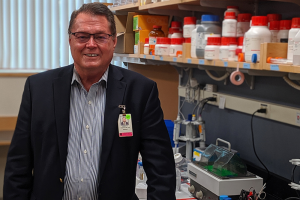Copyright © 2025 Open Medicine Foundation. All Rights Reserved.

From the desk of Ronald Tompkins, MD, ScD
Co-Director, Harvard ME/CFS Collaboration
Preliminary data analysis shows significantly higher levels of cytokines in patients post-exercise compared to healthy controls
It’s day four of our #MayMomentum campaign and we are so appreciative of your efforts to raise awareness of and money for ME/CFS research! It’s only with your support that we can continue to push for answers by funding open, collaborative research efforts.
On behalf of Open Medicine Foundation (OMF), I’m excited to share an update from my colleague Dr. David Systrom and his colleagues at the Brigham and Women’s Hospital from a study using samples collected from people with ME/CFS using Invasive Cardiopulmonary Exercise Testing, or ICPET.
Background
You might recall from past articles, we’ve referenced a phenomenon called “preload heart failure.”
 Simply put, preload failure (PLF) is when a patient during exercise exhibits impaired blood return to the heart. A significant subset of people with ME/CFS who were tested using ICPET experience PLF at maximum exercise. Aspects of this PLF are highly consistent with mechanisms that result in postural orthostatic tachycardia syndrome (POTS) and post-exertional malaise (PEM), both of which are common symptoms in people with ME/CFS.
Simply put, preload failure (PLF) is when a patient during exercise exhibits impaired blood return to the heart. A significant subset of people with ME/CFS who were tested using ICPET experience PLF at maximum exercise. Aspects of this PLF are highly consistent with mechanisms that result in postural orthostatic tachycardia syndrome (POTS) and post-exertional malaise (PEM), both of which are common symptoms in people with ME/CFS.
Investigators of Harvard’s ME/CFS Collaboration are evaluating participant’s blood samples extracted at three separate time-points during cardiopulmonary exercise testing: before, at peak, and one-hour after exercise. The goal is to identify abnormalities when blood is pumped from the heart and when it’s returned to the heart through computational analyses of the “multi-omics” data. In this case, researchers will analyze plasma samples through cytokines, metabolomics, and proteomics.
Preliminary Analysis
In the preliminary analysis of the cytokine data of the iCPET samples, we identified that exercise induced significantly higher levels of multiple cytokines in ME/CFS patients compared to the healthy controls. These results will be further investigated in the metabolomics and proteomics data.
In addition, muscle biopsies will be taken from the participants after the exercise. As controls, biopsies of bedrest volunteers have been analyzed.
Researchers will also conduct metabolic modeling to understand the metabolic dysfunction, which plays a pivotal role in ME/CFS. We are currently modeling the metabolic impact of long-term bed rest in young and older individuals. We will apply the same approach to studying the data of the iCPET study participants.
What does this mean for people with ME/CFS?
There is a strong likelihood that using proteomic and metabolic analysis, critical clues to what causes fatigue and inability to exercise may be identified in the blood of people with ME/CFS using an iCPET. We hope that as we receive further results, researchers will gain a better understanding of the underlying biology behind ME/CFS and PLF and be able to identify new drug targets and therapies for patients.
Now is a critical moment in our mission. In recognition of May ME/CFS Awareness month, OMF is leading the #MayMomentum campaign to increase awareness of ME/CFS and raise funds to advance urgently needed biomedical research.
Help us spearhead research efforts to find treatments and a cure for ME/CFS! With you on our team, we all have a reason to be hopeful!
OMF is a non-profit 501(c)(3) organization
(EIN# 26-4712664). All donations are tax-deductible to the extent allowed by law.



Open Medicine Foundation®
29302 Laro Drive, Agoura Hills, CA 91301 USA
Phone: 650-242-8669
info@omf.ngo
Copyright © 2025 Open Medicine Foundation. All Rights Reserved.
What are the advantages of giving from your Donor Advised Fund (DAF)?
How do I make a donation through my DAF?
Just click on the DAF widget below. It is simple and convenient to find your fund among the over 900 funds in our system.
Still can’t find your fund?
Gifting of Stock
Broker: Schwab
DTC #: 0164
Account #: 47083887
Account Registered as:
Open Medicine Foundation
29302 Laro Drive
Agoura Hills, CA 91301
Please speak to your personal tax advisor and then email or call OMF at 650-242-8669 to notify us of your donation or with any questions.